外研版(2019)必修 第二册Unit 6 Earth first Using language课件(共37张PPT)
文档属性
| 名称 | 外研版(2019)必修 第二册Unit 6 Earth first Using language课件(共37张PPT) |  | |
| 格式 | pptx | ||
| 文件大小 | 2.2MB | ||
| 资源类型 | 教案 | ||
| 版本资源 | 外研版(2019) | ||
| 科目 | 英语 | ||
| 更新时间 | 2023-11-03 21:45:36 | ||
图片预览

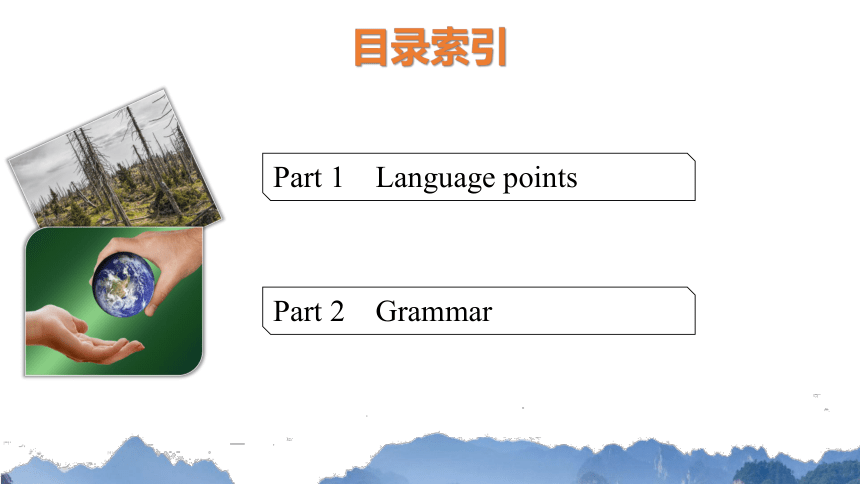
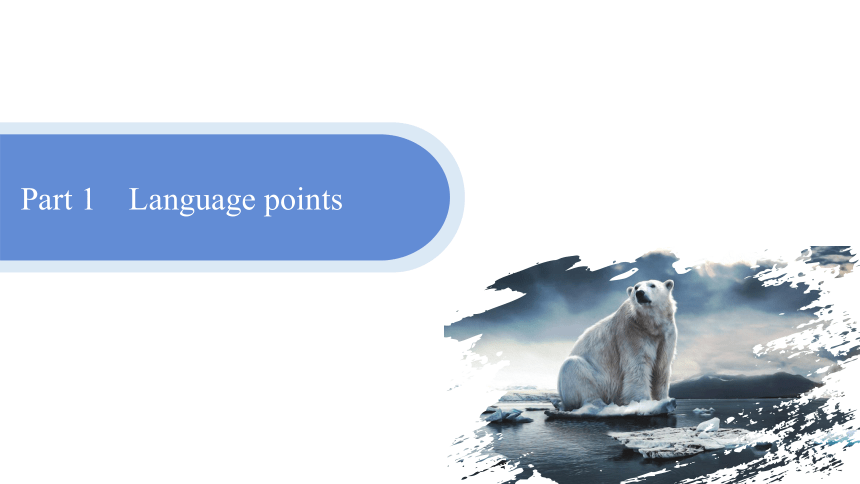
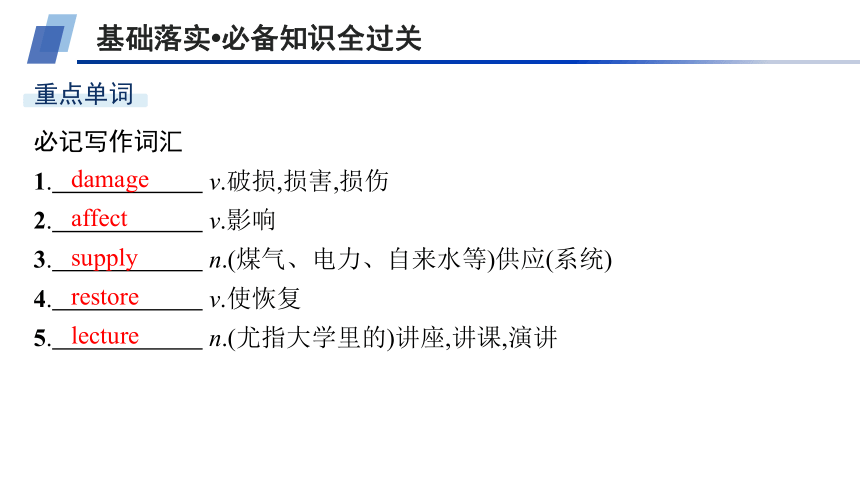
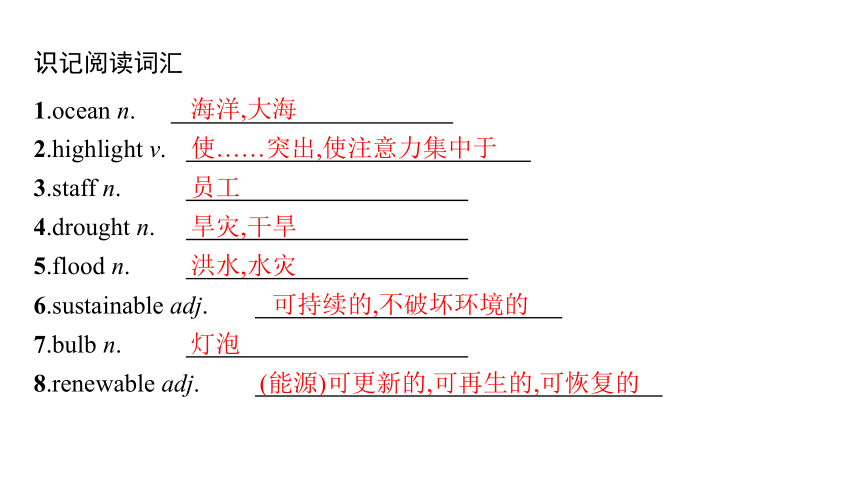
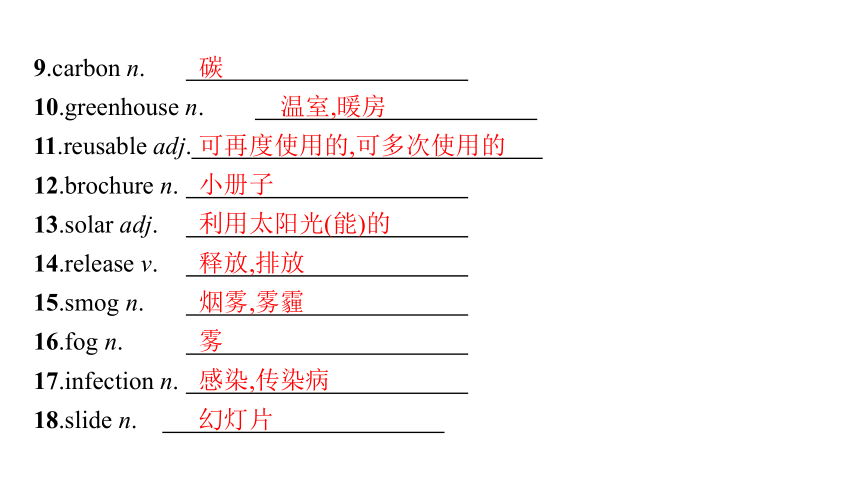
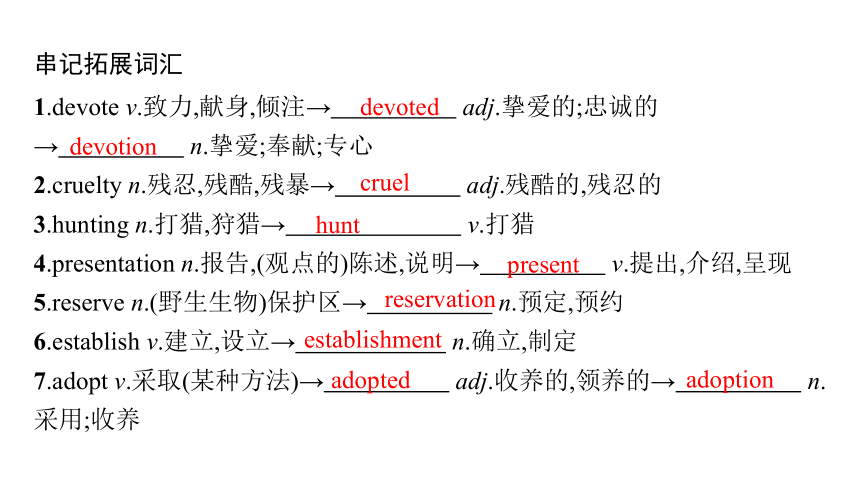
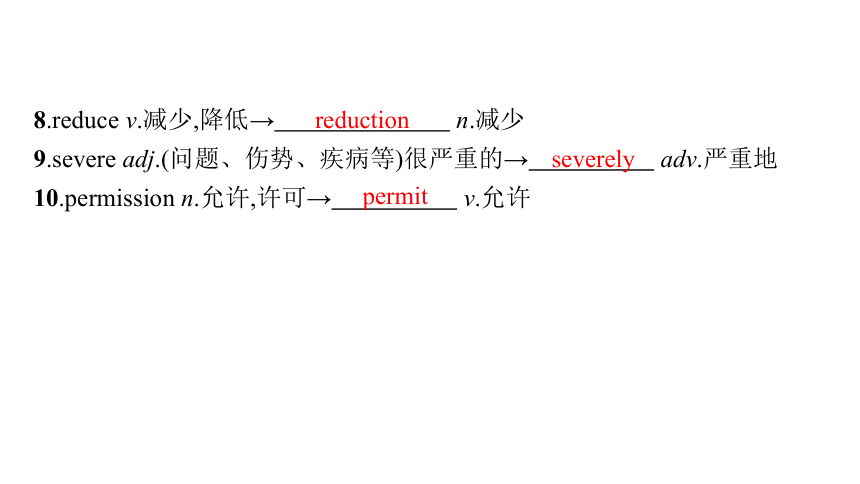

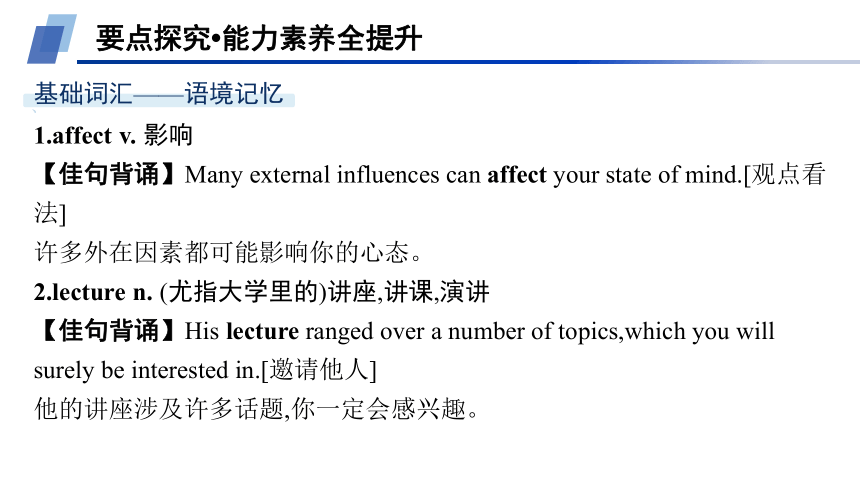
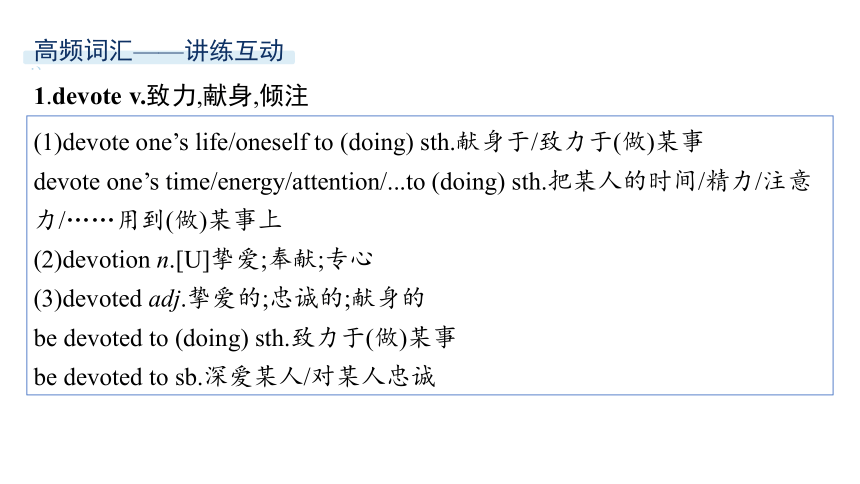
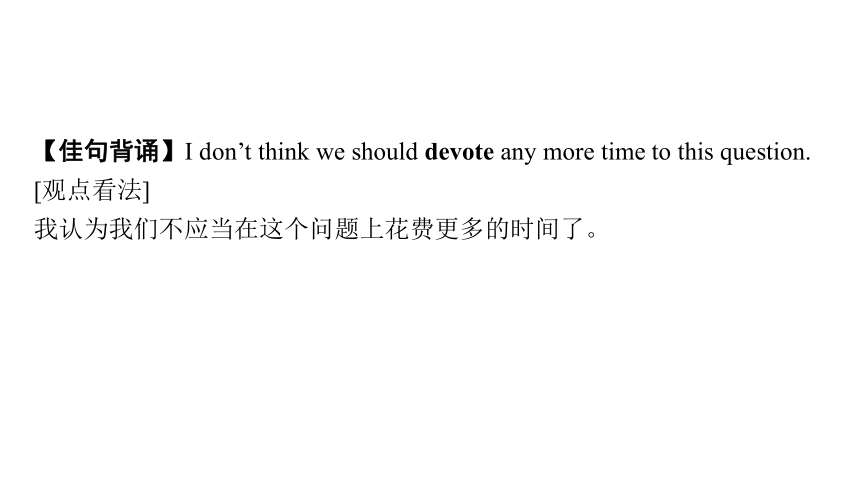
文档简介
(共37张PPT)
Unit 6 Earth first
Section B Using language
Part 1 Language points
Part 2 Grammar
目录索引
Part 1 Language points
基础落实 必备知识全过关
重点单词
必记写作词汇
1. v.破损,损害,损伤
2. v.影响
3. n.(煤气、电力、自来水等)供应(系统)
4. v.使恢复
5. n.(尤指大学里的)讲座,讲课,演讲
damage
affect
supply
restore
lecture
识记阅读词汇
1.ocean n.
2.highlight v.
3.staff n.
4.drought n.
5.flood n.
6.sustainable adj.
7.bulb n.
8.renewable adj.
海洋,大海
使……突出,使注意力集中于
员工
旱灾,干旱
洪水,水灾
可持续的,不破坏环境的
灯泡
(能源)可更新的,可再生的,可恢复的
9.carbon n.
10.greenhouse n.
11.reusable adj.
12.brochure n.
13.solar adj.
14.release v.
15.smog n.
16.fog n.
17.infection n.
18.slide n.
碳
温室,暖房
可再度使用的,可多次使用的
小册子
利用太阳光(能)的
释放,排放
烟雾,雾霾
雾
感染,传染病
幻灯片
串记拓展词汇
1.devote v.致力,献身,倾注→ adj.挚爱的;忠诚的
→ n.挚爱;奉献;专心
2.cruelty n.残忍,残酷,残暴→ adj.残酷的,残忍的
3.hunting n.打猎,狩猎→ v.打猎
4.presentation n.报告,(观点的)陈述,说明→ v.提出,介绍,呈现
5.reserve n.(野生生物)保护区→ n.预定,预约
6.establish v.建立,设立→ n.确立,制定
7.adopt v.采取(某种方法)→ adj.收养的,领养的→ n.采用;收养
devoted
devotion
cruel
hunt
present
reservation
establishment
adopted
adoption
8.reduce v.减少,降低→ n.减少
9.severe adj.(问题、伤势、疾病等)很严重的→ adv.严重地
10.permission n.允许,许可→ v.允许
reduction
severely
permit
重点短语
1. 害怕
2. 致力于
3. 对……有消极的影响
4. 用……代替……
5. 如果有必要的话
be frightened of
be devoted to
have a negative impact on
replace...with...
if necessary
要点探究 能力素养全提升
、
基础词汇——语境记忆
1.affect v. 影响
【佳句背诵】Many external influences can affect your state of mind.[观点看法]
许多外在因素都可能影响你的心态。
2.lecture n. (尤指大学里的)讲座,讲课,演讲
【佳句背诵】His lecture ranged over a number of topics,which you will surely be interested in.[邀请他人]
他的讲座涉及许多话题,你一定会感兴趣。
.、
高频词汇——讲练互动
1.devote v.致力,献身,倾注
(1)devote one’s life/oneself to (doing) sth.献身于/致力于(做)某事
devote one’s time/energy/attention/...to (doing) sth.把某人的时间/精力/注意力/……用到(做)某事上
(2)devotion n.[U]挚爱;奉献;专心
(3)devoted adj.挚爱的;忠诚的;献身的
be devoted to (doing) sth.致力于(做)某事
be devoted to sb.深爱某人/对某人忠诚
【佳句背诵】I don’t think we should devote any more time to this question. [观点看法]
我认为我们不应当在这个问题上花费更多的时间了。
【即学即练】单句语法填空/句型转换
①It’s unnecessary to devote any more time to (persuade) such a stubborn man to change his mind.
②He is so to his profession that I admire him for his . (devote)
③You will never achieve success unless you are devoted to your work.
→You will never achieve success unless you ___________ ___________ ___________your work.
persuading
devoted
devotion
devote yourself
to
2.reserve n.自然保护区;(野生生物)保护区;[pl.]储备(量),贮藏(量) vt.预订,预约(座位、席位、房间等);保留,预留
(1)a wildlife reserve 野生动植物保护区
keep sth.in reserve保留某物
(2)reserve sth.for sb.为某人预订/保留某物
(3)reservation n.[C]预订,预约;保留地,居留地;[C,U]保留意见
make a reservation预订,预约
without reservation毫无保留地
【佳句背诵】Many endangered animals are protected in nature reserves.[动物保护]
自然保护区保护着许多濒危动物。
【即学即练】单句语法填空/单句写作
①I’d like to reserve a table three at eight o’clock.
② He spent some of his money and kept the rest reserve.
③ I’d like to make a (reserve) for two nights for my family and myself in this hotel.
④她毫无保留地告诉了我有关此事的一切。
She told me all about it .
for
in
reservation
without reservation
3.supply n.(煤气、电力、自来水等)供应(系统) v.(尤指大量)供应,供给,提供
(1)water supply 供水
be in short supply供应短缺
a supply of/supplies of... ……的供应
supply and demand供求关系
(2)supply sb.with sth.=supply sth.to sb.
provide sb.with sth.=provide sth.for sb.
offer sb.sth.=offer sth.to sb.给某人提供某物
【佳句背诵】The drought is threatening the water supply in some areas.[社会生活]
干旱威胁着一些地区的用水供应。
【即学即练】单句语法填空/一句多译
①The brain requires constant supply of oxygen.
②Food was short supply all over the country then.
我们为饥饿的孩子们提供了食物。
→③We ________________ ___________ ___________ ___________ ___________ ___________.(with)
→④We __________________ ___________ ___________ ___________ ___________ ___________.(to)
→⑤We _____________ ___________ ___________ ___________ ___________ ___________.(for)
a
in
supplied/provided the hungry children
with food
supplied/offered food to the
hungry children
provided food for the
hungry children
4.adopt vt.采取(某种方法);正式通过 vi.& vt.收养,领养
(1)adopt an attitude/a method 采取一种态度/采用一种方法
(2)adopted adj.收养的,领养的
(3)adoption n.采用;收养
【佳句背诵】He decided to adopt a new approach to teaching languages.[学校生活]
他决定采用一种新的语言教学法。
【即学即练】单句语法填空/单句写作
①Tom is the son of Joanna,who him when his parents died 20 years ago.(adopt)
②Becoming a member of the society means (adopt) its values.
③If you cannot have children of your own,why not consider __________ (adopt)
④保罗的母亲因为自己无力抚养他,便将他送给别人收养了。
Paul’s mother ___________ ___________ ___________because she couldn’t look after him herself.
adopted
adopted
adopting
adoption
had him adopted
5.reduce v.减少,降低
(1)reduce...to...减少到……(表示减少后的量)
reduce...by...减少了……(表示减少的量)
(2)reduction n.降低,减少
【佳句背诵】Speaking of pollution,we really need to reduce the use of cars.[提供建议]
说到污染,我们真的需要减少汽车的使用。
【即学即练】单句语法填空/单句写作
①Though the price of the house has been reduced 10% since 2019,we can’t afford it either.
② Cost (reduce) is an important factor in improving the state of a business.
③雾很大,司机不得不把车速减到每小时四十千米。
It was so foggy that the driver had to ___________ ___________ ___________ ___________ ___________ ___________ an hour.
by
reduction
reduce the
speed to forty kilometres
Part 2 Grammar
语法冲关 语言规则全理清
情景导入
动词-ing形式和过去分词作宾语补足语
We have found our hometown ①changed a lot over the past ten years.The roads are seen becoming wider and wider.And we can notice high buildings ②finished one after another.Life in the town has become more convenient and comfortable than before.People can find their income ③increasing continuously.We can feel people ④enjoying their happy life.
【语法感悟】
(1)以上加黑部分都在句中作 。
(2)①②处的黑体词与宾语之间具有逻辑上的 关系。
(3)③④处的黑体词与宾语之间具有逻辑上的 关系。
宾语补足语
动宾
主谓
一、动词-ing形式作宾语补足语
1.构成-ing形式的动词与宾语之间的关系
动词-ing形式作宾语补足语,有doing和being done两种形式。构成-ing形式的动词与宾语之间若是逻辑上的主谓关系,则用doing表示正在进行的主动动作;若是逻辑上的动宾关系,则用being done表示正在进行的被动动作。
语法精讲
2.动词-ing形式作宾语补足语的情况
(1)位于感官动词后,如see,hear,feel,smell,watch,notice等。
We saw the teacher doing the experiment.
我们看到老师正在做实验。(表示正在进行的主动动作)
I saw her being questioned by the police.
我看到她正在被警察盘问。(表示正在进行的被动动作)
(2)位于使役动词后,如have,get,keep,leave等。
Don’t have the water running when you brush your teeth.
你刷牙的时候不要让水一直流。(表示正在进行的主动动作)
My mother kept me practising the piano,which made me very annoyed.
妈妈一直让我练钢琴,这让我很烦。(表示正在进行的主动动作)
(3)用于with复合结构中。
I couldn’t do my homework with the noise going on.
噪声不断,我无法做家庭作业。(表示正在进行的主动动作)
With so many people looking at her,she felt very nervous.
这么多人看着她,她感到很紧张。(表示正在进行的主动动作)
二、过去分词作宾语补足语
1.构成过去分词的动词与宾语之间的关系
(1)及物动词的过去分词用作宾语补足语时,宾语是构成过去分词的动词的逻辑宾语,宾语和构成过去分词的动词之间存在逻辑上的动宾关系。
I want the letter posted.
我想把这封信寄出去。
(2)少数不及物动词如go,fall等的过去分词作宾语补足语时,仅表示动作已完成。因此,宾语与构成过去分词的动词之间不存在逻辑上的动宾关系。
She found her necklace gone on her way home.
她在回家的路上发现她的项链不见了。
(3)动词seat,hide,dress等的过去分词作宾语补足语一般表示状态,而不表示被动意义。
When I came in,I found a strange girl seated in the corner.
我进来时发现一个陌生的女孩坐在角落里。
2.过去分词作宾语补足语的情况
(1)用在表示状态的动词keep,leave等的后面。
Don’t leave the window broken like this all the time.
不要让窗户一直像这样破着。
(2)用在使役动词have,get,make等的后面。
I have had my computer repaired.
我请人修了我的电脑。(主语请别人做某事)
I have had my bag stolen.
我的包被偷了。(主语遭受某种不幸)
He had the walls painted this morning.
他今天早上给墙刷了漆。
Alexander tried to get his work recognised in the medical circles.
亚历山大努力让他的工作得到医学界的认可。
I raised my voice to make myself heard.
我提高了嗓门以便被听到。
(3)用在感官动词watch,notice,see,hear,listen to,feel等的后面。
When we got to school,we saw the door locked.
当我们到学校时,看见门锁着。
(4)用在表示心理状态的动词think,suppose,consider等的后面。
They considered the matter settled.
他们认为这个问题解决了。
(5)用在表示“希望、要求”等的动词后面。这类动词有:like,want,wish,expect等。
The boss wouldn’t want the problem discussed at the moment.
那个老板不想现在讨论这个问题。
(6)用在with复合结构中作宾语补足语,过去分词与宾语之间是逻辑上的动宾关系。
With the work finished,they went to the seaside for a holiday.
他们做完了工作,到海滨去度假了。
三、-ing形式、过去分词、不定式作宾语补足语的区别
非谓语动词 作宾语补足语的用法
-ing形式 表示正在进行的主动动作或被动动作
I heard her singing an English song when I passed by her room yesterday.
昨天我经过她的房间时,听到她正在唱一首英语歌曲。
I heard a song being sung when I passed by her room yesterday.
昨天我经过她的房间时,听到有人在唱歌。
非谓语动词 作宾语补足语的用法
过去分词 表示被动或动作已完成
I heard the English song sung many times.
我听到那首英语歌曲被唱了许多次。
不定式 在with复合结构中,构成不定式的动词表示的动作还未发生;感官动词后作宾语补足语的不定式强调动作发生的全过程
With a lot of homework to do,Tom can’t go to the cinema with his father.
因为有很多作业要做,汤姆不能和他爸爸一起去看电影。
I heard her sing an English song just now.
我刚才听到她唱了一首英语歌曲。
【即学即练】单句语法填空
1.She wants her paintings (display) in the gallery,but we don’t think they would be very popular.
2.If she catches you (read) her diary,she’ll be angry.
3.It’s amazing how often you see people (use) mobile phones while driving.
4.They walked off and left me (sit) there alone.
5.He got up late,and went to school in a hurry,leaving his breakfast
(untouch).
displayed
reading
using
sitting
untouched
本 课 结 束
Unit 6 Earth first
Section B Using language
Part 1 Language points
Part 2 Grammar
目录索引
Part 1 Language points
基础落实 必备知识全过关
重点单词
必记写作词汇
1. v.破损,损害,损伤
2. v.影响
3. n.(煤气、电力、自来水等)供应(系统)
4. v.使恢复
5. n.(尤指大学里的)讲座,讲课,演讲
damage
affect
supply
restore
lecture
识记阅读词汇
1.ocean n.
2.highlight v.
3.staff n.
4.drought n.
5.flood n.
6.sustainable adj.
7.bulb n.
8.renewable adj.
海洋,大海
使……突出,使注意力集中于
员工
旱灾,干旱
洪水,水灾
可持续的,不破坏环境的
灯泡
(能源)可更新的,可再生的,可恢复的
9.carbon n.
10.greenhouse n.
11.reusable adj.
12.brochure n.
13.solar adj.
14.release v.
15.smog n.
16.fog n.
17.infection n.
18.slide n.
碳
温室,暖房
可再度使用的,可多次使用的
小册子
利用太阳光(能)的
释放,排放
烟雾,雾霾
雾
感染,传染病
幻灯片
串记拓展词汇
1.devote v.致力,献身,倾注→ adj.挚爱的;忠诚的
→ n.挚爱;奉献;专心
2.cruelty n.残忍,残酷,残暴→ adj.残酷的,残忍的
3.hunting n.打猎,狩猎→ v.打猎
4.presentation n.报告,(观点的)陈述,说明→ v.提出,介绍,呈现
5.reserve n.(野生生物)保护区→ n.预定,预约
6.establish v.建立,设立→ n.确立,制定
7.adopt v.采取(某种方法)→ adj.收养的,领养的→ n.采用;收养
devoted
devotion
cruel
hunt
present
reservation
establishment
adopted
adoption
8.reduce v.减少,降低→ n.减少
9.severe adj.(问题、伤势、疾病等)很严重的→ adv.严重地
10.permission n.允许,许可→ v.允许
reduction
severely
permit
重点短语
1. 害怕
2. 致力于
3. 对……有消极的影响
4. 用……代替……
5. 如果有必要的话
be frightened of
be devoted to
have a negative impact on
replace...with...
if necessary
要点探究 能力素养全提升
、
基础词汇——语境记忆
1.affect v. 影响
【佳句背诵】Many external influences can affect your state of mind.[观点看法]
许多外在因素都可能影响你的心态。
2.lecture n. (尤指大学里的)讲座,讲课,演讲
【佳句背诵】His lecture ranged over a number of topics,which you will surely be interested in.[邀请他人]
他的讲座涉及许多话题,你一定会感兴趣。
.、
高频词汇——讲练互动
1.devote v.致力,献身,倾注
(1)devote one’s life/oneself to (doing) sth.献身于/致力于(做)某事
devote one’s time/energy/attention/...to (doing) sth.把某人的时间/精力/注意力/……用到(做)某事上
(2)devotion n.[U]挚爱;奉献;专心
(3)devoted adj.挚爱的;忠诚的;献身的
be devoted to (doing) sth.致力于(做)某事
be devoted to sb.深爱某人/对某人忠诚
【佳句背诵】I don’t think we should devote any more time to this question. [观点看法]
我认为我们不应当在这个问题上花费更多的时间了。
【即学即练】单句语法填空/句型转换
①It’s unnecessary to devote any more time to (persuade) such a stubborn man to change his mind.
②He is so to his profession that I admire him for his . (devote)
③You will never achieve success unless you are devoted to your work.
→You will never achieve success unless you ___________ ___________ ___________your work.
persuading
devoted
devotion
devote yourself
to
2.reserve n.自然保护区;(野生生物)保护区;[pl.]储备(量),贮藏(量) vt.预订,预约(座位、席位、房间等);保留,预留
(1)a wildlife reserve 野生动植物保护区
keep sth.in reserve保留某物
(2)reserve sth.for sb.为某人预订/保留某物
(3)reservation n.[C]预订,预约;保留地,居留地;[C,U]保留意见
make a reservation预订,预约
without reservation毫无保留地
【佳句背诵】Many endangered animals are protected in nature reserves.[动物保护]
自然保护区保护着许多濒危动物。
【即学即练】单句语法填空/单句写作
①I’d like to reserve a table three at eight o’clock.
② He spent some of his money and kept the rest reserve.
③ I’d like to make a (reserve) for two nights for my family and myself in this hotel.
④她毫无保留地告诉了我有关此事的一切。
She told me all about it .
for
in
reservation
without reservation
3.supply n.(煤气、电力、自来水等)供应(系统) v.(尤指大量)供应,供给,提供
(1)water supply 供水
be in short supply供应短缺
a supply of/supplies of... ……的供应
supply and demand供求关系
(2)supply sb.with sth.=supply sth.to sb.
provide sb.with sth.=provide sth.for sb.
offer sb.sth.=offer sth.to sb.给某人提供某物
【佳句背诵】The drought is threatening the water supply in some areas.[社会生活]
干旱威胁着一些地区的用水供应。
【即学即练】单句语法填空/一句多译
①The brain requires constant supply of oxygen.
②Food was short supply all over the country then.
我们为饥饿的孩子们提供了食物。
→③We ________________ ___________ ___________ ___________ ___________ ___________.(with)
→④We __________________ ___________ ___________ ___________ ___________ ___________.(to)
→⑤We _____________ ___________ ___________ ___________ ___________ ___________.(for)
a
in
supplied/provided the hungry children
with food
supplied/offered food to the
hungry children
provided food for the
hungry children
4.adopt vt.采取(某种方法);正式通过 vi.& vt.收养,领养
(1)adopt an attitude/a method 采取一种态度/采用一种方法
(2)adopted adj.收养的,领养的
(3)adoption n.采用;收养
【佳句背诵】He decided to adopt a new approach to teaching languages.[学校生活]
他决定采用一种新的语言教学法。
【即学即练】单句语法填空/单句写作
①Tom is the son of Joanna,who him when his parents died 20 years ago.(adopt)
②Becoming a member of the society means (adopt) its values.
③If you cannot have children of your own,why not consider __________ (adopt)
④保罗的母亲因为自己无力抚养他,便将他送给别人收养了。
Paul’s mother ___________ ___________ ___________because she couldn’t look after him herself.
adopted
adopted
adopting
adoption
had him adopted
5.reduce v.减少,降低
(1)reduce...to...减少到……(表示减少后的量)
reduce...by...减少了……(表示减少的量)
(2)reduction n.降低,减少
【佳句背诵】Speaking of pollution,we really need to reduce the use of cars.[提供建议]
说到污染,我们真的需要减少汽车的使用。
【即学即练】单句语法填空/单句写作
①Though the price of the house has been reduced 10% since 2019,we can’t afford it either.
② Cost (reduce) is an important factor in improving the state of a business.
③雾很大,司机不得不把车速减到每小时四十千米。
It was so foggy that the driver had to ___________ ___________ ___________ ___________ ___________ ___________ an hour.
by
reduction
reduce the
speed to forty kilometres
Part 2 Grammar
语法冲关 语言规则全理清
情景导入
动词-ing形式和过去分词作宾语补足语
We have found our hometown ①changed a lot over the past ten years.The roads are seen becoming wider and wider.And we can notice high buildings ②finished one after another.Life in the town has become more convenient and comfortable than before.People can find their income ③increasing continuously.We can feel people ④enjoying their happy life.
【语法感悟】
(1)以上加黑部分都在句中作 。
(2)①②处的黑体词与宾语之间具有逻辑上的 关系。
(3)③④处的黑体词与宾语之间具有逻辑上的 关系。
宾语补足语
动宾
主谓
一、动词-ing形式作宾语补足语
1.构成-ing形式的动词与宾语之间的关系
动词-ing形式作宾语补足语,有doing和being done两种形式。构成-ing形式的动词与宾语之间若是逻辑上的主谓关系,则用doing表示正在进行的主动动作;若是逻辑上的动宾关系,则用being done表示正在进行的被动动作。
语法精讲
2.动词-ing形式作宾语补足语的情况
(1)位于感官动词后,如see,hear,feel,smell,watch,notice等。
We saw the teacher doing the experiment.
我们看到老师正在做实验。(表示正在进行的主动动作)
I saw her being questioned by the police.
我看到她正在被警察盘问。(表示正在进行的被动动作)
(2)位于使役动词后,如have,get,keep,leave等。
Don’t have the water running when you brush your teeth.
你刷牙的时候不要让水一直流。(表示正在进行的主动动作)
My mother kept me practising the piano,which made me very annoyed.
妈妈一直让我练钢琴,这让我很烦。(表示正在进行的主动动作)
(3)用于with复合结构中。
I couldn’t do my homework with the noise going on.
噪声不断,我无法做家庭作业。(表示正在进行的主动动作)
With so many people looking at her,she felt very nervous.
这么多人看着她,她感到很紧张。(表示正在进行的主动动作)
二、过去分词作宾语补足语
1.构成过去分词的动词与宾语之间的关系
(1)及物动词的过去分词用作宾语补足语时,宾语是构成过去分词的动词的逻辑宾语,宾语和构成过去分词的动词之间存在逻辑上的动宾关系。
I want the letter posted.
我想把这封信寄出去。
(2)少数不及物动词如go,fall等的过去分词作宾语补足语时,仅表示动作已完成。因此,宾语与构成过去分词的动词之间不存在逻辑上的动宾关系。
She found her necklace gone on her way home.
她在回家的路上发现她的项链不见了。
(3)动词seat,hide,dress等的过去分词作宾语补足语一般表示状态,而不表示被动意义。
When I came in,I found a strange girl seated in the corner.
我进来时发现一个陌生的女孩坐在角落里。
2.过去分词作宾语补足语的情况
(1)用在表示状态的动词keep,leave等的后面。
Don’t leave the window broken like this all the time.
不要让窗户一直像这样破着。
(2)用在使役动词have,get,make等的后面。
I have had my computer repaired.
我请人修了我的电脑。(主语请别人做某事)
I have had my bag stolen.
我的包被偷了。(主语遭受某种不幸)
He had the walls painted this morning.
他今天早上给墙刷了漆。
Alexander tried to get his work recognised in the medical circles.
亚历山大努力让他的工作得到医学界的认可。
I raised my voice to make myself heard.
我提高了嗓门以便被听到。
(3)用在感官动词watch,notice,see,hear,listen to,feel等的后面。
When we got to school,we saw the door locked.
当我们到学校时,看见门锁着。
(4)用在表示心理状态的动词think,suppose,consider等的后面。
They considered the matter settled.
他们认为这个问题解决了。
(5)用在表示“希望、要求”等的动词后面。这类动词有:like,want,wish,expect等。
The boss wouldn’t want the problem discussed at the moment.
那个老板不想现在讨论这个问题。
(6)用在with复合结构中作宾语补足语,过去分词与宾语之间是逻辑上的动宾关系。
With the work finished,they went to the seaside for a holiday.
他们做完了工作,到海滨去度假了。
三、-ing形式、过去分词、不定式作宾语补足语的区别
非谓语动词 作宾语补足语的用法
-ing形式 表示正在进行的主动动作或被动动作
I heard her singing an English song when I passed by her room yesterday.
昨天我经过她的房间时,听到她正在唱一首英语歌曲。
I heard a song being sung when I passed by her room yesterday.
昨天我经过她的房间时,听到有人在唱歌。
非谓语动词 作宾语补足语的用法
过去分词 表示被动或动作已完成
I heard the English song sung many times.
我听到那首英语歌曲被唱了许多次。
不定式 在with复合结构中,构成不定式的动词表示的动作还未发生;感官动词后作宾语补足语的不定式强调动作发生的全过程
With a lot of homework to do,Tom can’t go to the cinema with his father.
因为有很多作业要做,汤姆不能和他爸爸一起去看电影。
I heard her sing an English song just now.
我刚才听到她唱了一首英语歌曲。
【即学即练】单句语法填空
1.She wants her paintings (display) in the gallery,but we don’t think they would be very popular.
2.If she catches you (read) her diary,she’ll be angry.
3.It’s amazing how often you see people (use) mobile phones while driving.
4.They walked off and left me (sit) there alone.
5.He got up late,and went to school in a hurry,leaving his breakfast
(untouch).
displayed
reading
using
sitting
untouched
本 课 结 束
